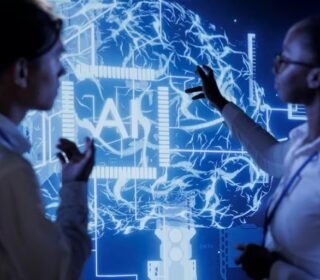UK launches new AI hubs to boost innovation and productivity

The UK government has announced the funding of nine new artificial intelligence (AI) research hubs that will deliver next-generation innovations and technologies across various sectors and applications. The hubs, which are supported by the Engineering and Physical Sciences Research Council (EPSRC), part of UK Research and Innovation (UKRI), aim to propel the UK to the forefront of advanced AI research and address key societal challenges.

APRIL: AI for electronics
One of the hubs is the AI for Productive Research and Innovation in Electronics Hub (APRIL), led by Professor Themis Prodromakis from the University of Southampton. APRIL seeks to bring the benefits of AI to the UK electronics industry, which is vital for the development of smart devices, sensors, and systems. APRIL will use AI to accelerate the design, testing, and manufacturing of electronic components and circuits and enable new functionalities and applications.
APRIL involves researchers from the University of Edinburgh, the University of Manchester, Imperial College London, and the University of Surrey, as well as industry partners such as ARM, IBM, and Siemens. Professors Subramanian Ramamoorthy and Mike O’Boyle from the School of Informatics at the University of Edinburgh are co-investigators of the hub.
Professor Prodromakis said: “We are delighted to be leading this national consortium that will bring together world-class researchers and industry partners to deliver cutting-edge AI solutions for the electronics sector. Our hub will create a new paradigm for electronics research and innovation, where AI is not only a consumer but also a producer of electronic systems.”
AI for healthcare and science
Another hub that will have a significant impact on society is the CHAI-EPSRC AI Hub for Causality in Healthcare AI with Real Data, led by Professor Guido Sanguinetti from the University of Edinburgh. CHAI will improve healthcare using AI by predicting outcomes and personalizing treatments, helping to unravel complex causal relationships within healthcare data. CHAI involves researchers from the University of Manchester, the University of Exeter, King’s College London, Imperial College London, and UCL, as well as NHS trusts and health-tech companies.
Professor Sanguinetti said, “We are very excited to be leading this ambitious project that will harness the power of AI to improve healthcare for millions of people. By developing novel AI methods that can infer causal relationships from real-world data, we will be able to provide better diagnoses, prognoses, and interventions for patients, as well as inform policy and decision-making in the health sector.”
Other hubs that will explore AI for science, engineering, and real-world data include:
- The AI Hub in Generative Models, led by Professor David Barber from UCL, will develop tools to help build responsible generative models that can create realistic and diverse data, such as images, text, and speech.
- The AI hub for Cyber Security, led by Professor Awais Rashid from the University of Bristol, will develop AI methods to detect, prevent, and respond to cyber threats, such as malware, ransomware, and phishing.
- The AI hub for chemical discovery, led by Professor Philip Biggin from the University of Oxford, will use AI to accelerate the discovery of new molecules and materials, such as drugs, catalysts, and batteries.
- The AI hub for Smart Cities and Environments, led by Professor Carsten Maple from the University of Warwick, will use AI to enhance the sustainability, resilience, and livability of urban and rural areas, such as transport, energy, and water systems.
AI for mathematics and computation
Three of the hubs will address the mathematics and computational research that is foundational to AI, playing a pivotal role in increasing our understanding of new, efficient AI systems. These hubs are:
- The AI hub for Learning from Data, led by Professor Mark Girolami from Imperial College London, will develop new mathematical and statistical methods to enable AI to learn from complex and noisy data, such as images, videos, and text.
- The AI Hub for Logic and Algorithms, led by Professor Anuj Dawar from the University of Cambridge, will explore the logical and algorithmic foundations of AI, such as reasoning, verification, and complexity.
- The AI Hub for Optimization and Learning, led by Professor Nick Gould from the University of Oxford, will investigate new optimization and learning techniques to improve the performance and scalability of AI algorithms, such as neural networks, graph algorithms, and combinatorial optimization.
A boost for the UK’s AI ecosystem
The investment in the new hubs, which amounts to £80 million over five years, is part of the UK government’s pro-innovation approach to AI, as outlined in the AI Regulation White Paper consultation response. The hubs will help deliver the capability the UK needs to realize the opportunities of this transformative technology, as well as ensure its ethical and responsible development and use.
The hubs will also support the training and development of the next generation of AI researchers and practitioners and foster collaboration and knowledge exchange among academia, industry, and the public sector.
Professor Charlotte Deane, Executive Chair of EPSRC, said: “Artificial intelligence is already transforming our world. EPSRC supports world-leading research to unlock its potential and ensure it is developed and used ethically and responsibly. Long-term research funding has led to revolutionary advancements that have made AI a powerful tool for many applications. These hubs will deliver revolutionary AI innovations and tools in sectors ranging from healthcare to energy, smart cities, and the environment. They will achieve this by solving key challenges and improving our understanding of AI, helping to drive the increased productivity and economic growth promised by this technology.”




